Natural remedies for constipation aren’t always backed up by evidence. It’s why, this post-Christmas season, we’re bringing you five that really work
Is anyone still suffering from Christmas bloat? The festive season has finished but expanding waistlines may only just be catching up with you. There is something about the festive Christmas season that makes even the least greedy person eat and drink more than they usually would. The onslaught of rich and indulgent festive food can lead to indigestion, bloating and even constipation – oh the glamour of Christmas.
‘Constipation can result in as few as three or less bowel movements a week,’ says Nutritional Director Rick Hay.
In some cases of constipation, symptoms such as fatigue, lethargy, abdominal pain, skin conditions and headaches are also prevalent.
If you are finding yourself constipated after the days of eating multiple mince pies or pigs in blankets, you’re likely to be finding it difficult to pass stools and may also have bloating and flatulence.
This can be truly uncomfortable, especially around this time of year when its dark, cold and wet and you are more likely to be sat in front of the TV surrounded by chocolate wrappers (or is that just me?)
Good news folks, Nutritionist Rick Hay is here to help us prevent this constraining condition. Here are 5 natural remedies for constipation with good evidence behind them if you are worried about your bowel movements.
Constipation remedy #1 Start the day with healthy fats
If you are finding yourself slightly more ‘backed up’ than usual, try starting the day with a breakfast that contains healthy fats. Aim for food such as avocados, nuts, seeds, sardines or organic eggs.
In fact, a study looking at the effects of olive oil and flaxseed oil (both healthy fats) for the treatment of constipation found that a daily intake of both these oils was effective in treating and lessening symptoms of constipation.
‘Healthy fats eaten for breakfast will stimulate the gastrocolic reflex’ says Hay. This means that the simple act of eating stimulates movement in the gastrointestinal tract (digestive tract).
The classic avocado on toast with a poached egg or an egg fried in olive oil, would be an excellent option here. Or if you don’t have the luxury of time, have some sugar-free peanut butter with a banana or a handful of mixed nuts with some berries.
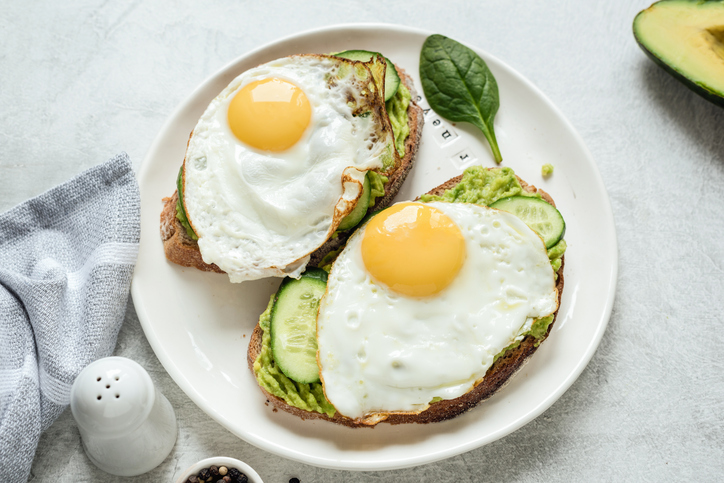
Rule #2 Eat more veggie and vegan foods
Who else has been told that prunes are an excellent remedy for constipation? Well this is no old wives’ tale, if you have some prunes lying around then brilliant, gulp those down asap if you are struggling in the toilet department.
In the UK most people do not eat enough fibre. The recommended daily intake of fibre for the average adult is 30 grams. However, the average intake for women is 17.2 grams of fibre with men consuming only slightly more at 20.1 grams.
One cup of pitted, uncooked prunes contains 12 grams of fibre, meaning prunes are a great way to up your fibre intake. Other foods that are a great source of fibre are fruits such as, berries, melon, pears and oranges. Vegetables too are high in fibre, such as broccoli, carrots and sweetcorn.
Beans, pulses, potato with skins and quinoa are also excellent options if you are needing to up your daily fibre intake.
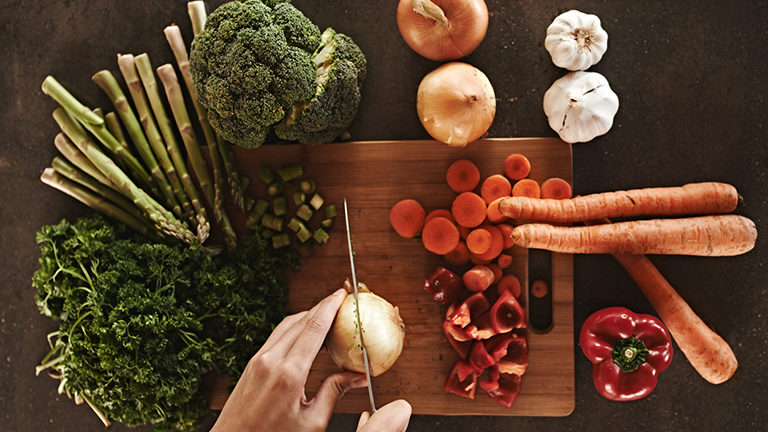
A study in the World Journal of Gastroenterology, looking to investigate the effect of dietary fibre intake on constipation, conducted a meta-analysis on 1,322 potentially relevant articles.
The study found that dietary fibre showed significant advantage over placebo in stool frequency. Meaning that dietary fibre will increase stool frequency (the amount of times you go to the toilet) in patients with constipation, but wont necessarily improve stool consistency (loose or solid stools).
If you know you are one of those people who isn’t getting enough fibre and as a result elimination when going to the toilet is sluggish, then try increasing your vegan and vegetarian food intake as this will also increase your fibre intake.
Aim to fill at least half of your plate with veggies or other forms of dietary fibre. This should help with movement in your gastrointestinal tract.
Rule #3 Stay hydrated
A boring rule I know but important none the less. Where your gut health is concerned, it is important to stay hydrated.
Nowadays, people are more likely to start their day with a coffee or energy drink. These caffeinated drinks, especially coffee are diuretics which will make you go to the toilet more often.
Frequent urination with the additional lack of water intake will lead to dehydration. This is why constipation is often seen to be a result of the typical modern diet and lifestyle.
A study of 1,040 articles looking into the role of water and fluid intake in the prevention and treatment of constipation in children and adolescents found evidence indicates that there is an association between lower fluid intake and intestinal constipation.
constipation is often seen to be a result of the typical modern diet and lifestyle.
Make a rule of drinking a whole glass of water first thing in the morning and then before every meal. Not only will this kick start your digestive system, but will also rehydrate you after after not drinking whilst you have been asleep for eight or so hours.
Hay advises that we should also try to have a glass of warm water and lemon first thing in the morning, whilst also being mindful that we consume eight or so glasses of water during the rest of the day.
Rule #4 Go jogging or strike a ‘yoga’ pose
Exercise (jogging especially) is great for constipation problems. Running and jogging ‘jiggles’ the bowels around which stimulates peristalsis (the involuntary constriction and relaxing of the intestine that helps to move waste through it).
Nowadays, most people lead sedentary lifestyles, due to office-based work. Add this to a low-fibre and caffeine-rich diet and you’ll understand how easy it can be to end up with a sluggish digestive system. Reduced mobility is likely to be a significant cause of constipation in elderly individuals or those with a physically disabling condition.
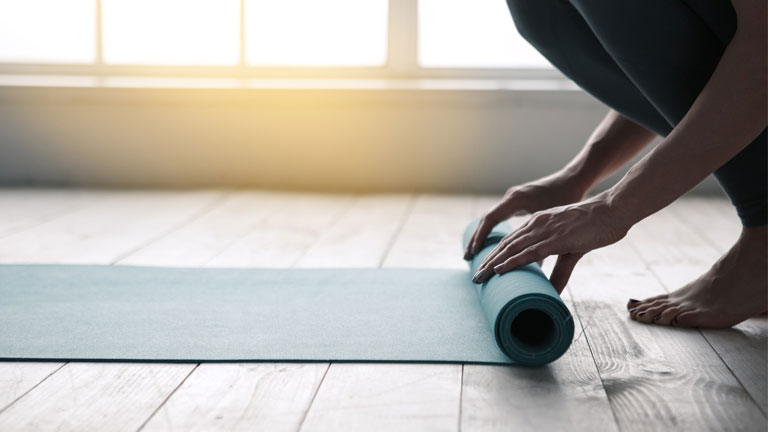
For those that don’t particularly like to exercise or can’t due to medical purposes, mindfulness, yoga, stretching or abdominal massage can also help.
Abdominal massage can improve constipation by encouraging movement of waste through the colon and reducing subjective feelings of stress.
A study on the effects of aroma massage and meridian massage on constipation and stress in women college students saw 38 women receive either an aroma massage or a meridian massage, five days a week for four weeks.
The aroma massage was given using aroma oil, a mixture of lemon, lavender, rosemary, and cyprus. The meridian massage was given at nine accupoints which influence intestinal functions.
Abdominal massage can improve constipation by encouraging movement of waste through the colon
A constipation severity score, weekly defecation frequency, and a stress response score were measured before and after every week of the experiment.
The study found that both abdominal massages relieved constipation and stress. Resorting to either types of massage will contribute to the reduction of use of stool softeners or enemas.
Rule #5 Pop a probiotic
Probiotics help to balance the bacteria in our gut. ‘Probiotics are live microorganisms that contain ‘good bacteria’ says Hay. ‘They can be consumed through fermented foods or supplements.’
‘Probiotics help your digestive system by restoring the natural balance of bacteria in your gut. An imbalance is usually caused when there’s too much bad bacteria, compared to the amount of good bacteria.
‘Typical symptoms of excess bad bacteria in the gut include excess bloating, flatulence, general discomfort and heart burn.’
Psyllium husk is known as the intestinal broom, it contributes to healthy intestinal transit
Similar to digestive enzymes, probiotics aid in the absorption of food. By increasing the number of good bacteria, probiotics allow you to absorb nutrients more efficiently. Probiotics also help with regularity and can also be used to prevent diarrhea.
Probiotics can be found in fermented foods, such as yoghurt, kimchi and sauerkraut, but an easier way to balance your gut bacteria is through supplementation.
A study of 660 records looking to investigate the effect of probiotics on gut transit time, stool output, and constipation symptoms in adults found that overall, probiotics significantly reduced whole gut transit time by 12.4 hours, increased stool frequency by 1.3 bowel movements a week and improved stool consistency.
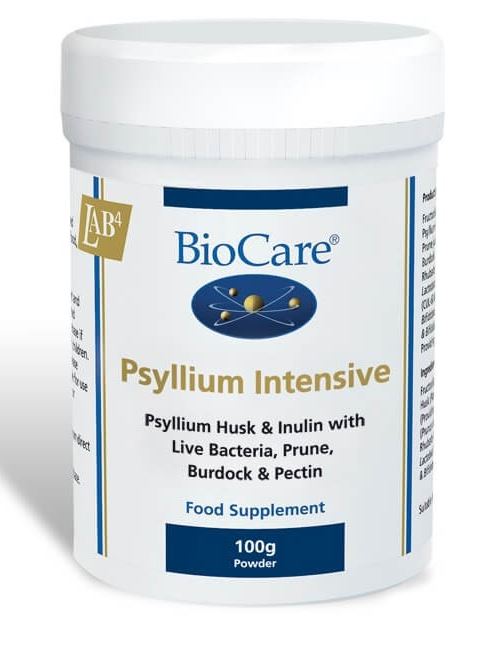
Hay recommends taking Biocare Bioacidophilus forte with the clinically reaserched LAB 4 probiotic complex. Combine this with Psyllium Intensive which contains psyllium husk, inulin, burdock, pectin and probiotics and you should experience some relief.
Psyllium husk is known as the intestinal broom, it contributes to healthy intestinal transit and maintains a healthy bowel.
A study looking to investigate the effect of LAB4 (a multistrain probiotic) in alleviating the symptoms of irritable bowel syndrome (IBS), saw 52 participants with IBS (which includes similar symptoms to constipation such as stomach paina dn excessive gas) who were randomised to receive either a probiotic or a placebo for eight weeks. Participants reported their IBS symptoms using a questionnaire fortnightly.
The study found that there was a significant improvement in the Symptom Severity Score of IBS over the eight week study. The study also showed an improvement in scores for quality of life, days with pain and satisfaction with bowel habit of the participants taking the probiotic.
What does you poo say about you?
More from Ask the nutritionist:
5 bloating fixes you can do tonight
The energy boosting supplement that could change the way you exercise
How to get healthy cholesterol levels
Which 2 essential nutrients does everyone need?

Rick Hay is a nutritionist with a special interest in anti-ageing and many years clinical experience in nutrition, naturopathy and botanical medicine. He specializes in obesity treatment and weight management. He writes a regular Natural Health and Fitness Blog for Healthista. Find out more at rickhay.co.uk. Follow Rick on Twitter @rickhayuk
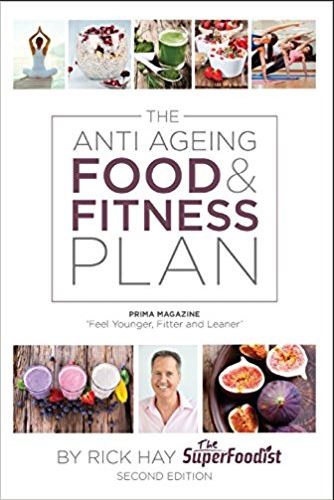 Rick Hay’s book the Anti Ageing Food and Fitness Plan is available to buy on Amazon.
Rick Hay’s book the Anti Ageing Food and Fitness Plan is available to buy on Amazon.
